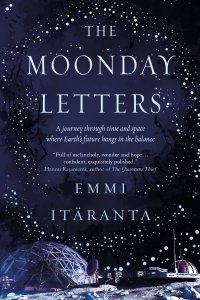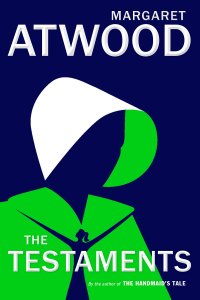Paul Di Filippo Reviews The Moonday Letters by Emmi Itäranta
 The Moonday Letters, Emmi Itäranta (Titan 978-1803360447, trade paperback, 368pp, $15.95) July 2022.
The Moonday Letters, Emmi Itäranta (Titan 978-1803360447, trade paperback, 368pp, $15.95) July 2022.
One of John Campbell’s prescriptions for the kind of science fiction he wanted to see was to say, paraphrased, “Give me a story which could legitimately be presented as contemporary fiction in a magazine of the year 2100.” In other words, a story narrated out of a deep and implicit and shared set of assumptions about what contemporary reality (i.e., daily life in 2100) involved. No infodumps, no “As you know, Bob” moments, no hand-holding of the reader. And quite often, especially with the work of Heinlein, he managed to secure such fiction.
However, taken to an extreme, this technique produces a novel like the cult classic Murder in Millennium VI, which is deliberately opaque because it explains nothing. You almost have to be a citizen of Curme Gray’s Millennium VI to understand it. But done properly, with subtle concessions to the game being played, a science fiction novel can come to seem particularly otherworldly, an atemporal artifact dredged from the timestream. I have not read John Crowley’s “In Blue” for many years now, but I recall getting this feeling from that novella.
Now, Finnish writer Emmi Itäranta delivers a seamless, impeccably narrated book that creates the same pleasurably eerie (or eerily pleasurable) sensation of being dumped down into a totally foreign milieu. Luckily for us, though, she so deftly conveys the parameters and history of her future that immersion is not a shock, but like slipping into a warm bath. (Aside from the informative words of her protagonist, Itäranta offers a few quotes from “nonfiction” secondary sources when she simply must give us important info, in good old Jack Vance style.)
Before detailing the charm and accomplishments of The Moonday Letters (published in Finnish in 2020, and her third book), I should mention that it bears no translator credit, indicating that Itäranta handled that task herself. And what an outstanding accomplishment! The prose of the book is measured, evocative, lucid, poetic, full of gravitas and emotion alike. This puts Itäranta in the same linguistic league as Nabokov, Conrad, Thomas Olde Heuvelt and Hannu Rajaniemi, masters in dual languages.
As you might expect from the title, this is an epistolary novel, a fairly rare critter nowadays. The vast majority of the letters are composed by our heroine, Lumi Salo, but we also experience a few missives from her spouse, Sol Uriarte, and from a journalist named Enisa Karim. The year is 2168, and the scenario is very similar to the classic Eight Worlds setup pioneered by John Varley: lots of colorful, prosperous habitats throughout our Solar System, with Earth the semi-abandoned derelict member of the tribe. Lumi is originally from Earth, the region called Winterland, and her parents still live there. But she is now a citizen of everywhere, thanks to her job. She is a healer, whose psychical skills in curing illness rely on mental travel to an alternate dimension, full of spirit guide animals and certain dangers. (I often think back to Vonda McIntyre’s Dreamsnake and Zelazny’s The Dream Master as the Ur examples of this trope.)
Lumi is living what she thinks is a very happy and placid and contented life with her spouse, Sol Uriarte, until the moment when Sol goes missing. A biologist and geneticist by trade, Sol is often away at conferences. But now—in a sequence of events that have a certain farcical element—Lumi keeps missing him at one prearranged meeting place after another. Sol has a lot of excuses why, but something plainly is amiss. (Her travels are one clever way Itäranta introduces us to many venues.) Then comes a rather more serious incident, making it look as if Sol has been abducted or gone rogue. Lumi’s quest now becomes one of trying to understand all the previously hidden, destabilizing structures of their lives that motivated this absence. Her quest also sweeps up her relation with Vivian Berg, the enigmatic older woman who first taught Lumi the healing arts. Soon, she is forced to confront the fact that nothing is as it seems, and that her life was built on sand. And at that moment, a global tragedy strikes…
Itäranta’s ability to imagine and depict new societies and ways of living remind me of John Kessel’s similar strengths when he gave us The Moon and the Other. Her focus on multivalent or ambiguous personalities and their actions brings to mind the shifting novels of Christopher Priest and Jeff VanderMeer. And her themes of ecological responsibility and crimes and the nature of life in the Anthropocene hark to the works of Kim Stanley Robinson. Blend them all together, and you get a bravura, complex tapestry of a book.
Lumi’s path and fate are, in some sense, a true tragedy. And yet she ends her saga with a sense of acceptance and wisdom about life.
Worlds and time and stories grow into thin ghosts overlapping and interlacing each other, our shared past is two separate ones, and many, invisible or only partially visible. What has been is different, and all pasts and futures happen at once in endless worlds. In each world we lose each other, and find each other, and lose each other again. I sit on the edge of each universe and watch as they all unravel and gather again into ever-different skeins…
Words to live by, in any era.
 While you are here, please take a moment to support Locus with a one-time or recurring donation. We rely on reader donations to keep the magazine and site going, and would like to keep the site paywall free, but WE NEED YOUR FINANCIAL SUPPORT to continue quality coverage of the science fiction and fantasy field.
While you are here, please take a moment to support Locus with a one-time or recurring donation. We rely on reader donations to keep the magazine and site going, and would like to keep the site paywall free, but WE NEED YOUR FINANCIAL SUPPORT to continue quality coverage of the science fiction and fantasy field.
©Locus Magazine. Copyrighted material may not be republished without permission of LSFF.






